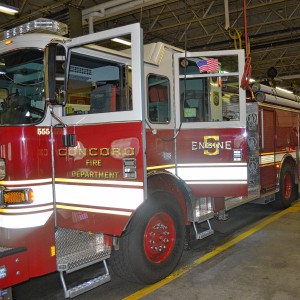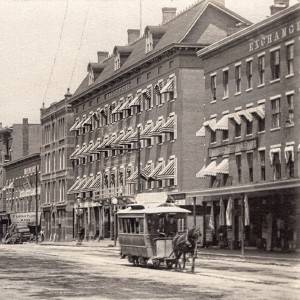The life and death of a mill that defined a New Hampshire town
| Published: 12-15-2017 3:13 PM |
When Jamie Sayen describes Groveton as a “company town,” shaped and shaken from top to bottom by the rise and fall of its paper mills, he’s not kidding. In its heyday, Groveton Papers even crawled inside your nose.
“I knew it was important to get home before 9 p.m. … because the sulfur smell took over the town after that time” is how Greg Cloutier recalls his childhood in the North Country town in the 1950s and 1960s, as quoted in Sayen’s terrific new book, You Had a Job for Life: Story of a Company Town.
Former mill worker Lolly LaPointe echoed that: “I’ve seen times when you’d come out of that mill and you’d want to walk on your hands and knees to try to get under that stuff so you could breathe. It would bring water right up to your eyes,” LaPointe told Sayen.
In other words, life in the company town known as “stinky Groveton” was pretty bad? Not at all.
“We played games. Kids talked to each other then. … We made our own happiness. We had a ball,” recalled Shirley Brown, one of the dozens of people Sayen quoted who talked about life in a small town where everybody knew everybody and helped each other. “It was the best years of our lives.”
And don’t forget the jobs, and the money – 800 people worked for the mill in its heyday, most at union wages. Certainly, the struggling town of Northumberland, of which Groveton is a part, would love to have them back today, although it wouldn’t be too crazy about all the pollution that was dumped in the Ammonoosuc River as part of it.
Such a mix of good and bad fills the 260 pages of You Had a Job for Life, which is a richly reported history of the mill from its beginnings in 1891 to its abrupt closing in 2007.
Co-workers helped each other one minute and tormented each other the next. The town pulled together one year, was torn apart by one of several strikes against the mill in the next. The family-run management was incredibly supportive at times, hiring people with mental problems and paying them union wages because they were part of the community, and vicious at other times, blackballing people from the entire industry on a whim and creating an environment where workers literally doffed their caps when the owner walked by them on the street. And the paper plants themselves were great to work in – friendly, accessible, flexible to workers’ needs – but were also miserable: hot, dangerous, dirty.
Article continues after...
Yesterday's Most Read Articles
 N.H. Educators voice overwhelming concerns over State Board of Education’s proposals on minimum standards for public schools
N.H. Educators voice overwhelming concerns over State Board of Education’s proposals on minimum standards for public schools
 “It’s beautiful” – Eight people experiencing homelessness to move into Pleasant Street apartments
“It’s beautiful” – Eight people experiencing homelessness to move into Pleasant Street apartments
 Voice of the Pride: Merrimack Valley sophomore Nick Gelinas never misses a game
Voice of the Pride: Merrimack Valley sophomore Nick Gelinas never misses a game
 Matt Fisk will serve as next principal of Bow High School
Matt Fisk will serve as next principal of Bow High School
 Former Concord firefighter sues city, claiming years of homophobic sexual harassment, retaliation
Former Concord firefighter sues city, claiming years of homophobic sexual harassment, retaliation
 A trans teacher asked students about pronouns. Then the education commissioner found out.
A trans teacher asked students about pronouns. Then the education commissioner found out.
If you’re looking for an anti-corporate screed or a rose-colored-glasses view of small-town life, You Had a Job for Life is not for you. But if you’re interested in a multi-faceted look at an important aspect of New Hampshire’s personality, shown through the people who lived it, and reported at unusual depth, you might want to give it a shot.
“Early on, I made a decision: ask questions, see what happens. I wasn’t trying to prove that the mill was good or bad,” Sayen said. “Over time, this complex and rich story begins to emerge.”
Over time, indeed.
This 260-page oral history, just published by University Press of New Hampshire, traces its roots back to 2009 when Sayen was taking an ethnology course at Plymouth State University and needed to develop an oral history project.
Sayen lives in the woods a few miles from the mills and has a long history of interaction with them, mostly involving protests against their pollution, so his attention turned in that direction. He hunted down some former employees and started asking questions.
“I knew within three or four people I was hooked,” he said. “The people I was interviewing were so decent, so interesting, they could tell so many parts of the puzzle.”
Eight years later, following interviews with more than 50 people and countless hours transcribing interviews, the book is out.
The prize catch for Sayen was Jim Wemyss Jr., a.k.a. “Young Jim,” the son of the “Old Jim” who bought the mill in 1940, who not only did interviews but participated in some public speaking events as part of this project.
For three decades Young Jim ran the mill with an iron hand in a velvet glove. He was an “alpha male personality,” who was a mix of tyranny and sympathy, sometimes both at once.
“Wemyss was also a notorious practical joker who might light a cherry bomb and fling it anonymously into the office of one of his mill managers, or fire off his small cannon to entertain an IRS agent assigned to audit the mill,” Sayen wrote. “Many of his employees loved Wemyss; others loathed him.”
Among the Wemyss stories is the time that, still dressed in a tuxedo from a party, he jumped into a pit of sludge to free a stuck pipe, rather than shut down the plant for hours while it was drained.
What makes You Had a Job for Life so great is the variety of responses that Sayen got from people who worked in the plant, the office, and who lived in town – a function, I suspect, of perseverance.
“I asked them about their experiences, and about the third or fourth interview this guy started telling me about all the times he was drunk in the mill … and his supervisor would cover for him. So I did start asking about it: did you encounter drinking in the mill? And they would talk about it,” he said.
Similarly, he discusses pilfering, and bullying, and other less-than-attractive aspects of working there.
“Most of the downside stuff was stuff they volunteered. I would ask about the smell, obviously, and they would fill in how that affected them, but otherwise they mentioned it themselves,” Sayen said.
Yet people had many happy memories of the days when Groveton was still stinky.
The paper plants in Groveton went through a complicated industrial history after the Wemyss family sold them to Diamond International in 1968, with Young Jim staying on as manager. They split in two for a while, were sold several times to various conglomerates, and sold off tens of thousands of acres of forestland, but nothing could stem the decline of the Northern New England paper-making industry, a victim of changing habits and low-cost competition.
The plants closed in 2005 and 2007, and “the greater Groveton economy remains shell-shocked,” with perhaps half of the town’s storefronts still empty.
Sayen includes some suggestions in the back of his book for how places like Groveton can try to recover. Not surprisingly, perhaps, he’s no fan of trying to lure one big employer.
“One of the lessons from the mill is that we don’t want to replay this movie again. The bring-Amazon-in approach, I fear, sets us up for the same kind of economic uncertainty, global economies, that did us in the first time,” he said.
He argues that it’s possible to have a forest-based economy in the North Country, but that it should be locally-owned, not too big, focusing on niche products and basic needs.
Whatever you think of that argument, the details in You Had a Job for Life will make you think. But don’t worry: You’ll be entertained while you do it.
(David Brooks can be reached at 369-3313 or dbrooks@cmonitor.com or on Twitter @GraniteGeek.)

 Concord Monitor editor Mike Pride’s final book explores the lives, works of Northern New England poets
Concord Monitor editor Mike Pride’s final book explores the lives, works of Northern New England poets Active Aging: John Burke of Peterborough celebrated his 81st birthday with 81 hikes up Pack Monadnock
Active Aging: John Burke of Peterborough celebrated his 81st birthday with 81 hikes up Pack Monadnock Vintage Views: From darkness to light
Vintage Views: From darkness to light From the farm: Spring brings calves, beautiful calves
From the farm: Spring brings calves, beautiful calves
